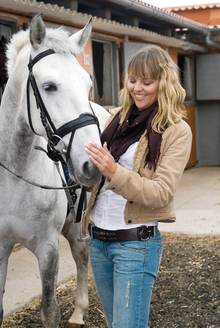Newsdate: Mon, 15 Dec 2014 - 07:32 am
Location: WASHINGTON, DC
When we think of animal adoption, we generally think of adopting a cat or a dog, even a hamster. But what about adopting a horse? Although it may sound strange to some, horse rescues provide the same adoption opportunities for horses, as traditional rescues do for cats and dogs.

Plan for Progress - Rehabing and rehoming rescued horses
The clinic, and virtual training program, has made a tremendous difference for the horses in the immediate care of our participants. But more importantly, the future is now brighter for the thousands of horses that will be rescued in the future.
Unfortunately, like the dogs and cats that end up in shelters, many of the horses that end up in rescue have suffered from cruelty or neglect. But unlike the cats and dogs in shelters, there are not as many resources to help the staff of horse rescues rehabilitate traumatized horses, making it more difficult to find them new homes.
The HSUS and FFA’s Plan for Progress is helping horse rescues around the country to rehab and rehome their rescued horses
Three years ago The Humane Society of the United States through its affiliate The Fund for Animals, opened up the Doris Day Equine Center to assist horses in need and change the image of horses in rescue. The Center has become the home for many of the horses that are rescued from our own cruelty cases.
But we wanted to do more than just help the horses that end up at our facility. We wanted to help the thousands of other horses, and the dedicated staff working to rehabilitate them, around the country who have suffered some form of trauma.
So this year The HSUS teamed up with Carter Horse Ranch, a renowned trainer in natural horsemanship, to create a year-long, virtual training program called Plan for Progress. The program is designed specifically for trainers working with horses that have been through traumatic experiences.
Twenty-seven horse rescues, over 125 trainers, participated on monthly calls and watched detailed training videos giving them hands-on training support to improve their equine training skills. Some of the training topics included:
- Equine Safety Tips
- Catching
- Trailer Loading
- Coaching
- Tying and Knots
- Farrier & Veterinary Handling
- Equine Behavior
In addition to allowing for ongoing discussions and feedback, the monthly calls provided an invaluable networking opportunity for organizations with limited time and resources to interact with their peers. Through the calls, our participants were able to interact with other like-minded rescue organizations about implementing standards for rehabilitating and training horses humanely, efficiently and effectively.
The culmination of the year-long training program was a three day hands-on live horse clinic hosted by our Doris Day Equine Center. Nineteen horse rescue trainers from all parts of the county, including California, Kansas, Iowa, New Mexico, Florida and Colorado, participated in a program designed to better train and equip rescues with the necessary skills to successfully rehome horses.
The clinic, and virtual training program, has made a tremendous difference for the horses in the immediate care of our participants. But more importantly, the future is now brighter for the thousands of horses that will be rescued in the future.
The HSUS is committed to assisting as many horse rescues as possible and will be offering more of these live clinics and online training programs in 2015.
